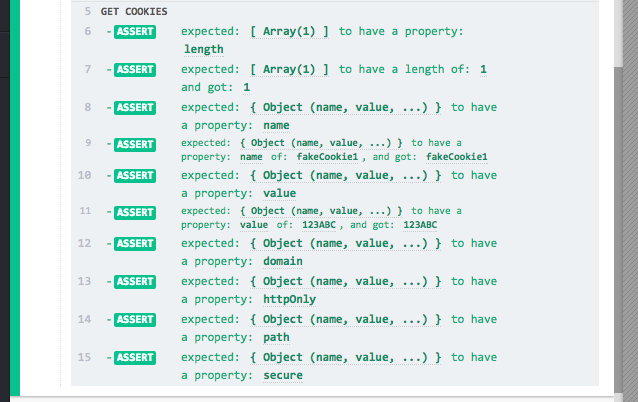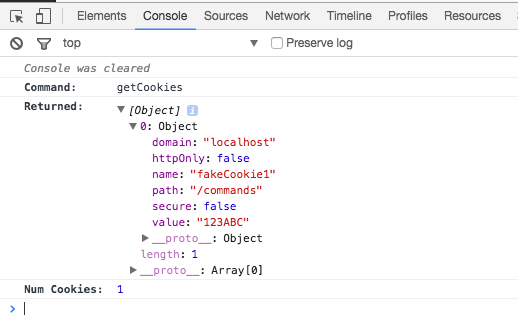getCookies
Get browser cookies for the current domain or the specified domain.
Syntax
cy.getCookies()
cy.getCookies(options)
Usage
Correct Usage
cy.getCookies() // Get cookies for the currrent domain
Arguments
options (Object)
Pass in an options object to change the default behavior of cy.getCookies().
| Option | Default | Description |
|---|---|---|
domain | Hostname of the current URL | Retrieves the cookies from the specified domain |
log | true | Displays the command in the Command log |
timeout | responseTimeout | Time to wait for cy.getCookies() to resolve before timing out |
Yields
cy.getCookies() yields an array of cookie objects. Each cookie object has the
following properties:
domain: (String)expiry: (Number) (if specified)hostOnly: (Boolean) (if specified)httpOnly: (Boolean)name: (String)path: (String)sameSite: (String) (if specified)secure: (Boolean)value: (String)
cy.getCookies() is not a query. It will not update the returned list if
further cookies are added after it initially executes.
Examples
Get Cookies
Get cookies after logging in
In this example, on first login our server sends us back a session cookie.
// assume we just logged in
cy.contains('Login').click()
cy.url().should('include', 'profile')
cy.getCookies()
.should('have.length', 1)
.then((cookies) => {
expect(cookies[0]).to.have.property('name', 'session_id')
})
Rules
Requirements
cy.getCookies()requires being chained off ofcy.
Assertions
cy.getCookies()will only run assertions you have chained once, and will not retry.
Timeouts
cy.getCookies()should never time out.
Because cy.getCookies() is asynchronous it is technically possible for there
to be a timeout while talking to the internal Cypress automation APIs. But for
practical purposes it should never happen.
Command Log
Get browser cookies and inspect all properties
cy.getCookies()
.should('have.length', 1)
.then((cookies) => {
expect(cookies[0]).to.have.property('name', 'fakeCookie1')
expect(cookies[0]).to.have.property('value', '123ABC')
expect(cookies[0]).to.have.property('domain')
expect(cookies[0]).to.have.property('httpOnly')
expect(cookies[0]).to.have.property('path')
expect(cookies[0]).to.have.property('secure')
})
The commands above will display in the Command Log as:

When clicking on getCookies within the command log, the console outputs the
following:

History
| Version | Changes |
|---|---|
| 5.0.0 | Removed experimentalGetCookiesSameSite and made sameSite property always available. |
| 4.3.0 | Added sameSite property when the experimentalGetCookiesSameSite configuration value is true. |